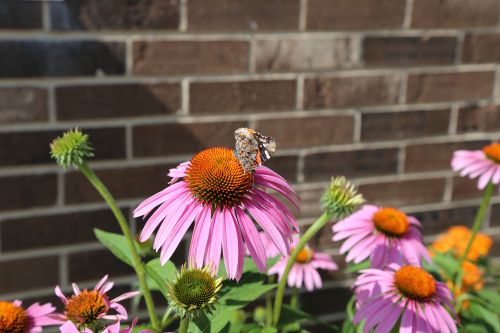Green Spaces Improve Communities
“Ooh, a butterfly!”
The little girl threw her arm and pointed towards the lush greenery against the Okemos library. She looked at her dad excitedly. His face lit up as bright as the August sun.

Indifferent to their joy, the butterfly carried on doing whatever it is a butterfly does with their day. The bees buzzed, the birds hopped about, the earthworms wriggled below the cool dark soil. And inside Mr. Tom shared an early garden harvest.
Everyone and everything reaps the benefits of green spaces.
- In urban areas, these spaces can mitigate the effects of pollution and heat brought in by human activity.
- Access to nature improves our physical and mental health.
- Evidence strongly suggests that it promotes education, creating opportunities to exercise critical thinking, creativity, problem solving and communication skills.
This definitely rings true for our libraries.

For one hour every week, CADL Dansville’s garden belongs to the kids of Miss Harriet’s storytime group.
After reading a nature-themed book they head to the garden to care for the plants. A little water here, some pruning there, and by the end of the summer they enjoy the fruits (or in this case, fresh herbs) of their labor.
“The kids help with everything, from cleaning out the garden beds in the beginning, to harvesting their little peppers and herbs and bundles of lavender for their mothers,” said Harriet. “They enjoy the watering. And making new friends. They learn where their food comes from, and they’re excited to create and make it happen.”
All the green spaces at our libraries serve our communities. At a few of them you’ll notice something extra special – They’ve joined the growing movement to plant native wildlife gardens!

“I believe that space should be useful.” Said Sherri McConnell, Head Librarian of our Stockbridge branch. “The grass and shrubs we had before looked nice, but it’s what I’d call a sterile landscape… there was no food, no shade, no substantial resources for our pollinators and local wildlife.”
She continued, “It wasn’t even a space we could really utilize. It didn’t draw anybody to spend time there, and not many learning opportunities grow from grass lawns.”
It takes a special kind of knowledge to grow and establish native plants. When Sherri reached out to Stewarding Stockbridge for help, the environmental volunteer group was more than eager to provide it. Most of the plants donated to the garden were grown right in the backyard of a volunteer, who continues to assist with the maintenance while the plants get established.
Native plants take longer to establish than traditional garden options, but like a gorgeous fall bloom the result is worth the wait.
Native species save us time and money.
- They require less maintenance overall than their traditional counterparts since they’re adapted to our local environment.
- Their resistance to local pests reduces the need for harmful chemicals, and they are more likely to survive and thrive through adverse weather conditions.
At its very core a library’s mission is to serve its community. By prioritizing green spaces CADL is caring for the health and happiness of everyone and everything.
As long as we can help it, we’ll continue providing spaces for the bees to buzz, the birds to hop about, and the earthworms to wriggle around in their cool dark soil.
And a butterfly to brighten little moments like the August sun.
Get Involved
Here are some great free resources to improve your own green spaces, or enjoy the ones around you! Click on the header to go to the page.
Seed Library
Pick up free seeds for flowers, veggies and herbs from the library.
LoT Recreation
Check out lawn games, sports equipment, binoculars, cameras and more.
LoT Park Passes
Enjoy free admission to Ingham County Parks and Potter Park Zoo!
Michigan Activity Pass
Get discounts and perks to outdoor and indoor attractions across Michigan.
Science & Nature Events
Attend gardening classes, storytimes and so much more at our branches!
Green Reads
Connect to nature with a wide range of titles involving gardening, foraging, ecosystems and entertainment.

